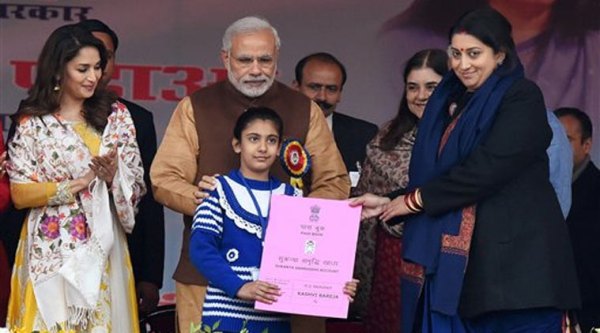- India
- International
Haryana: Why should we spend on a girl who will bring us no money?
Haryana has the country’s worst child sex ratio, and 12 of its 21 districts are gender-critical.
 Prime Minister Narendra Modi with Union HRD Minister Smriti Irani presenting the Sukanya Samriddhi account pass-book to a girl during its launch at Beti Bachao Beti Padhao programme in Panipat on Thursday. Actress Madhuri Dixit is also seen. (PTI Photo)
Prime Minister Narendra Modi with Union HRD Minister Smriti Irani presenting the Sukanya Samriddhi account pass-book to a girl during its launch at Beti Bachao Beti Padhao programme in Panipat on Thursday. Actress Madhuri Dixit is also seen. (PTI Photo)
On Thursday, as Narendra Modi launched his government’s ‘Beti Bachao, Beti Padhao’ scheme from a stage in Panipat, in another district less than 100 km away, groups of women discussed the social situation and mindsets that had prompted the Prime Minister to launch his attack against the “mental illness” and “medieval mindset” that led to the “sin” of female foeticide.
The village of Shimli, not far from the district headquarters of Rohtak, has one of the worst child sex ratios (CSR) in notoriously girl child-unfriendly Haryana — a mere 400 girls for every 1,000 boys, less than half that of the state as a whole.
At the local anganwadi centre where significantly larger numbers of boys than girls were receiving immunisation shots, the 27-year-old wife of a Scheduled Caste plumber said she had a boy, but wanted another. “It’s not enough to be the mother of one boy. We need two lathis to be able to hold our head high in society,” she said.
The woman had had a baby boy in July, two years after she had given birth to a girl. She recoiled as an auxillary nurse and midwife suggested she might want to now consider sterilisation. “No madam,” she blurted out. “I will let you know when I need the operation.”
Local health workers said they suspected at least eight women from the village had undergone sex-selective abortions over the last year. This woman could come back soon with another baby boy, they predicted.

In another part of the village, 60-year-old Sheela, whose family makes a living by selling the milk of their two buffaloes, is upset with her daughter-in-law for producing two girls in a row. “We desperately need a boy now. Who will sell our milk in future?”
Rajbala, 62, is a mother of four daughters who has now adopted a relative’s son who will inherit the family’s land. “In our time, sex-selective abortions were not possible,” she said. “Despite the odds, I educated all my girls up to class 10.”
One of her daughters had wanted to join the police, Rajbala said, but “my huband told her that he could not afford to pay the Rs 2 lakh bribe for a police job. It was either a dowry for her or the job.” They took the decision that made sense, Rajbala said: “Why would we spend Rs 2 lakh on a job that would bring money not to us, but to her in-laws?”
Rajbala now wants her daughters to “plan” their own families better. And she is convinced that “crackdowns on ultrasound clinics will not work until the social conditions that make girls unwanted change”.
Haryana has the country’s worst child sex ratio, and 12 of its 21 districts are gender-critical. Dozens of villages across the state have a CSR of under 600. Shimli’s critical CSR is despite its proximity to the district headquarters where surveillance of sex-selective abortions is strong, and the fact that the village has a middle school.
Anganwadi workers said sex-selective abortions are now no longer confined to relatively prosperous villages whose residents can afford the hefty charges of dodgy ultrasound clinics and doctors willing to carry out illegal abortions.
“No one wants to try endlessly for a boy these days. If the first child is a daughter, chances are high the second child even in lower middle class households will be a ‘technology-enabled’ boy,” anganwadi worker Ajitha said.
The loitering army of unmarried young and not-so-young men in the village, and the high incidence of sex crimes ensure few parents send their daughters to high school, either in Rohtak or in the neighbouring village. “Why would anyone want a girl in these times? Just sending them to school is fraught with danger,” said Shakuntala, a retired headmistress.
Nearly 30 FIRs have been registered in the last few months as Haryana has cracked down on illegal medical practitioners and dubious ultrasound diagnostic centres. Dr Ramesh Dhankar, Chief Medical Officer of Jhajjar, which has seen an improvement in CSR, said, “Strict enforcement of the PNDT Act and surveillance of pregnant women and dodgy doctors will improve CSR in the short term, but can’t be a lasting solution. Root causes such as dowry and crimes against women will have to be addressed.”
Apr 25: Latest News
- 01
- 02
- 03
- 04
- 05








































